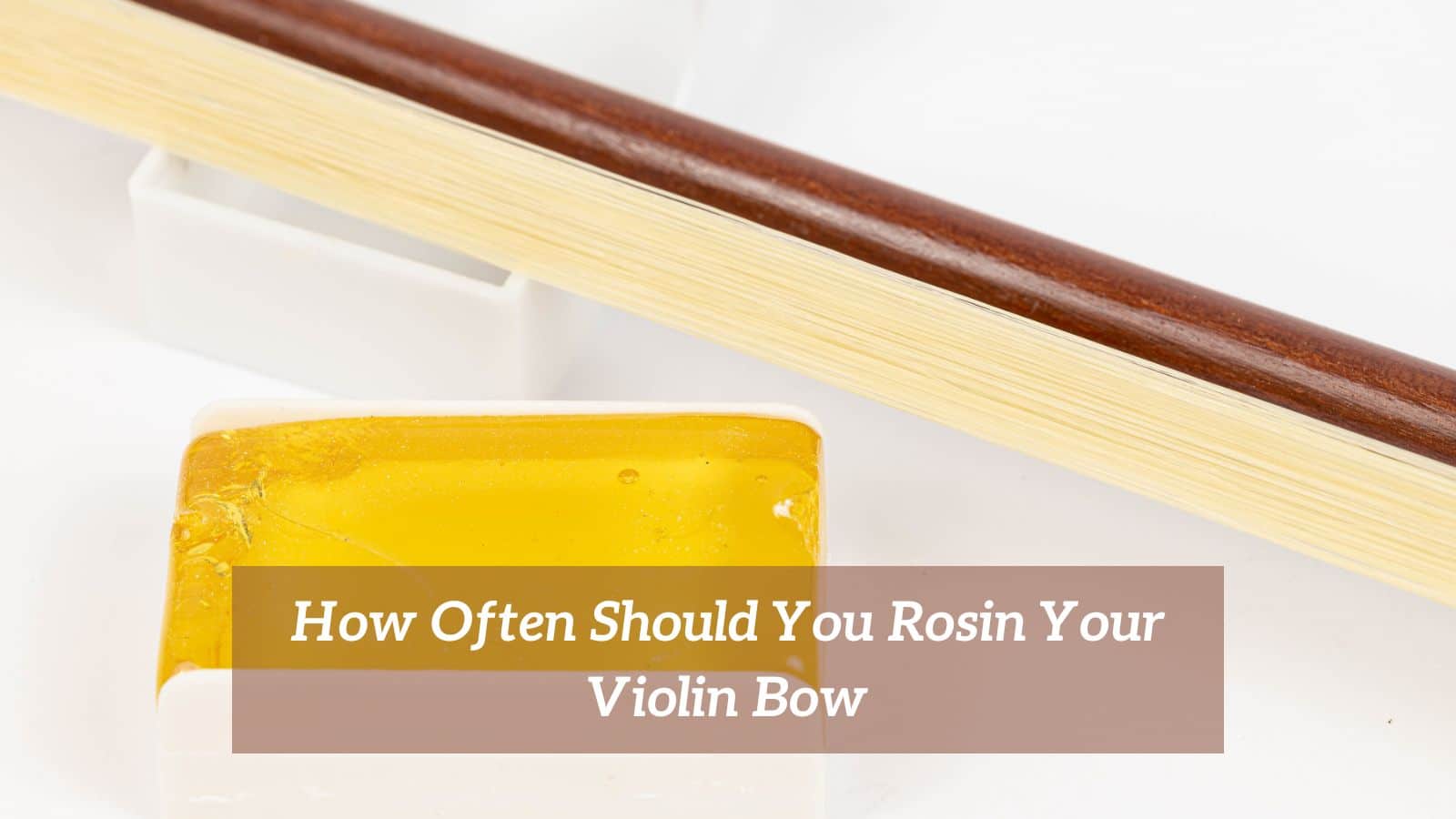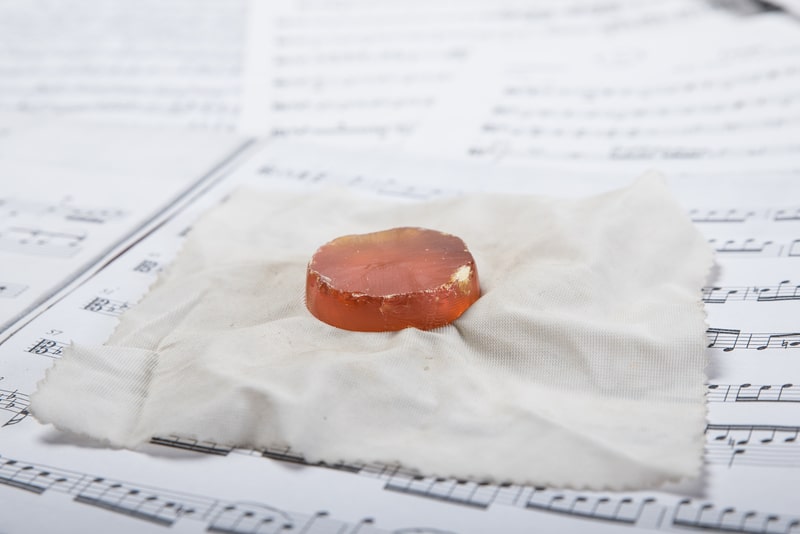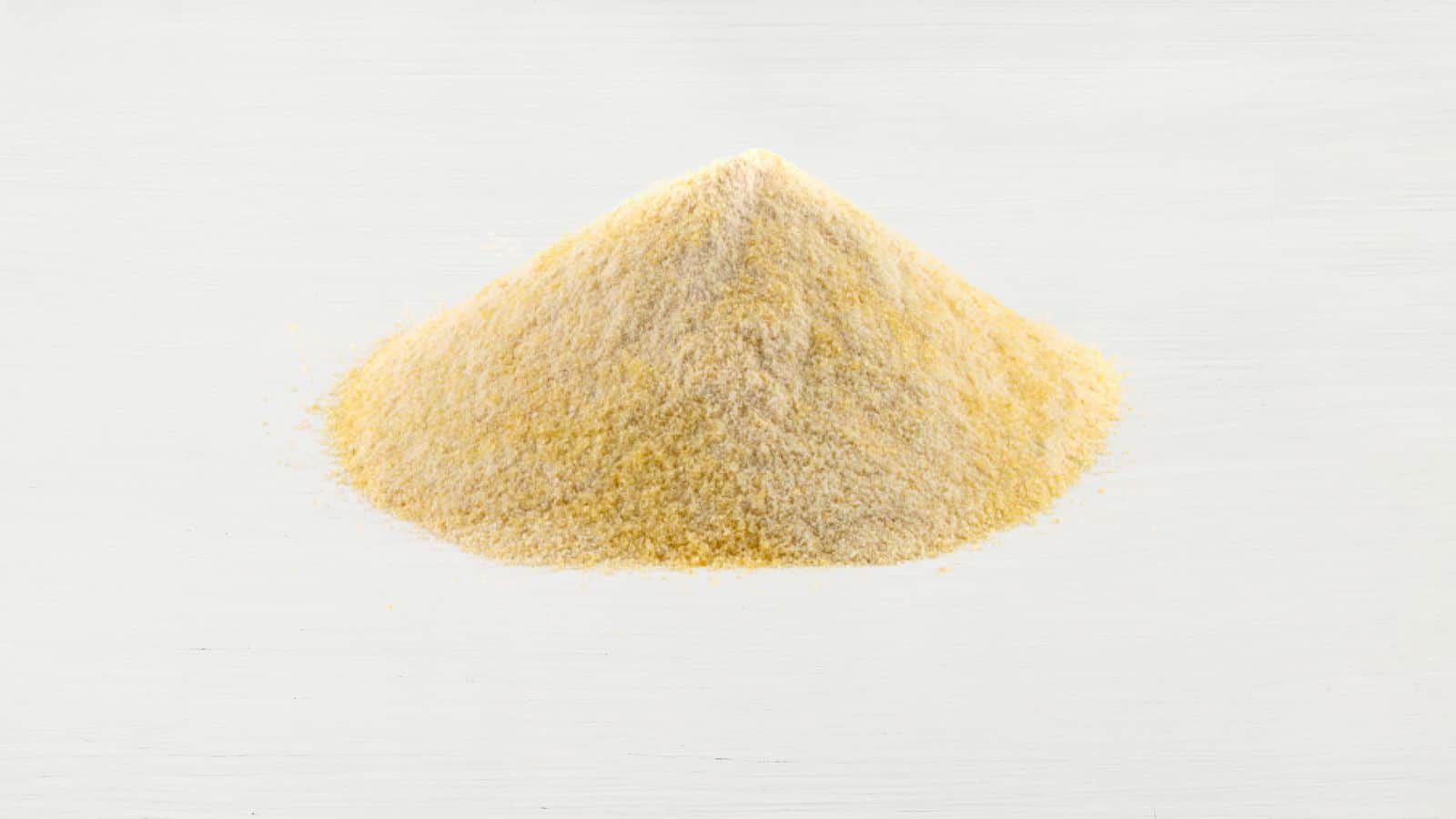
A common question among violin players, especially beginners, is how often the rosin should be applied to the bow and what the ideal amount is. The answer may seem pretty obvious: enough to make the sound come out of the violin clearly and smoothly.
There are, however, many variables that should be taken into account: type of rosin, quality and age of hair, weather conditions, etc. In this article we will go through each of these aspects in details.
How Often Should You Rosin Your Violin Bow
Type of hair
There are two main types of hair: synthetic and natural. Synthetic hair tends to not absorb much of the rosin whereas the natural hair tends to keep the rosin for longer period of time.
Players using synthetic hair – which is the standard in every beginner’s outfit – will need to reapply rosin more often than those who use natural horse hair.
Quality of rosin
There are many different formulas and qualities of rosin as well. Some are made of wood resins and some of bee wax. Recipes vary a lot: some contain more or less non-organic materials.
Some may create a lot of dust and not stick so well to the hair whereas other types of rosin may stick too much and produce a more scratchy sound. Depending on the type of rosin used, the player will need to apply more or less rosin in a shorter or longer period of time.
Setting
Some players, especially those who play solos with big orchestras, tend to use more rosin in order to achieve a greater and powerful sound to fill a big room, because rosin helps in the projection of sound.
Dark vs. light rosin
Dark rosin is more suitable for cool and dry climates. It is naturally softer and sticks more easily to the hair and to the strings. Light rosin, in turn, is harder and probably will need to be applied more times to the hair, although producing a more smooth sound.
Old vs. new hair
If the hair is too old, it may not be holding the rosin well, thus the player will constantly feel the need of applying more rosin, and the result may not always be satisfactory.
Ideally the hair should be replaced every six months of a moderate amount of daily practice. New hair will naturally have a quicker response and the player will not need to apply too much rosin, except for the first few times when the hair is still new.
Quality of hair
Good horse hair will deliver the best results and hold the rosin well. Usually the best hair comes from Mongolian horses. Synthetic hair will definitely not hold rosin as much as the natural hair, and may even break more often if it is of poor quality.
Humidity
When the weather is too humid, more rosin is necessary to compensate the need of more friction in order to put the strings into vibration. In rainy days, violinists may want to apply some little extra rosin to have a more powerful and projected sound.
Rosin excess
Applying too much rosin may produce an undesired scratchy sound. Depending on the brand, the cake of rosin may release too much dust which will be immediately spread throughout the instrument and inhaled by the player.
If the cleaning is not done immediately, wiping the dust that becomes ingrained in the instrument – both outside and inside – becomes a very difficult task. There are, however, some players that do apply a lot of rosin when performing in big halls for the sake of gaining sound projection and volume.
Lack of rosin
Rosin is necessary to create friction between hair and strings. If there is not enough rosin in the hair, the string will not vibrate properly and the sound will become dull or non-existent.
Some people prefer not to use too much rosin, depending on the circumstances, to avoid any undesirable scratchy sound, especially in small rooms. Less rosin allows for a smooth and less edgy sound.
General care
Touching the hair can damage the hair because of the natural oil present in the hands. By doing that frequently, the rosin will stop adhering to the hair and there will not be enough friction between the hair and the strings and consequently no sound will be produced.
Cleaning the bow
It is important to clean the bow hair regularly so as to avoid the excess of rosin that slowly gets ingrained in it. Although it is not a common practice among violinists, brushing the hair with a dry toothbrush can extend the life span of the hair and improve the sound quality.
Applying the rosin
First, tighten the bow hair. Second, hold the cake of rosin with your left hand. Then, by putting the right thumb near the ferrule to avoid the rosin to break, move the bow back and forth with small movements heading slowly towards the tip, and then back to the frog.
The whole process should not take more than 15 or 20 seconds. As you play the violin, the shound should come out clean, smooth, projected and not scratchy.
New cake of rosin
If the cake of rosin is absolutely new, it has a complete smooth and shiny surface unable to create enough friction upon contact with the hair. It is necessary to sand it a little with a soft sandpaper before the first use.
New hair
If the hair is new and rosin has never been applied to it before, it has also a smooth surface unable to create enough friction against the strings.
Luthiers usually apply rosin in powder because it adhered easier to the hair. If you do not have an old piece of rosin that can be broken into pieces, you can still apply your regular cake of rosin normally but the whole process may take up to two or three minutes.
When to reapply the rosin
The answer depends on a number of factors: intensity of the practice session, characterists of the rosin and hair, weather conditions, etc.
Some individuals may need to reapply rosin twice a day, whereas others will apply the rosin once every two days. For a more precise answer, it is advisable to apply rosin everytime the sound is not coming out clearly and well projected.
Beginners may need to apply rosin before every practice session because they bows normally have synthetic hair. Intermediate and advanced will intuitively know when to apply more rosin.


